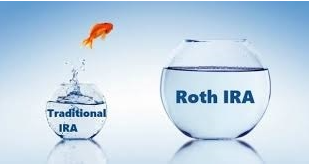A Roth conversion is the process of repositioning your assets from a Traditional IRA to a Roth IRA. It is a unique and exciting retirement savings
opportunity! The purpose of the conversion would be to shift your assets into a Roth IRA which has the optimal tax-favored status.
So why would you consider such a move?
• Qualified distributions in retirement will be tax-free.
• Roth IRA owners are NOT required to take distributions while alive, allowing more flexibility on income tax planning.
• The Roth is a more flexible IRA for legacy planning or passing on to your heirs.
We had a client who came to us concerned about the substantial Traditional IRA they had amassed over their career. They were in a moderate tax bracket and were concerned that their Required Minimum Distributions from their IRA were going to be a burden. As this account was a substantial part of their wealth, they were also concerned about an efficient way to pass this asset on to their heirs. We recommended a Roth conversion over the next few years to slowly decrease their IRA balance to reduce future IRA RMDs.
Now, in retirement, our client enjoys unique tax diversification. Due to flexibility on if/when they take distributions from the Roth IRA, and the tax-free nature of these distributions; we can have better control over the distributions they take from the account, and their overall tax liability.
Our client was also very intrigued when we explained that their heirs would receive Roth IRA distributions tax-free. Their Roth is now allowing very flexible legacy planning.
The owner of the Roth IRA does not have to take Required Minimum Distributions from their account, unlike traditional IRA which require them to start distributions after they reach age 73. They can decide how much to take from the Roth IRA each year depending on their income, or one can
choose not to make any withdrawals.
In sum, it makes sense for you to make a Roth IRA conversion if:
• You expect to be in the same or higher tax brackets during retirement.
• You are looking for tax diversification in retirement.
• You may not need the funds for retirement and are considering transferring them to your beneficiaries.
• You won’t need the converted Roth Funds for at least five years.
It would be wise to find an advisor who could create an accurate projection for you to determine if a Roth IRA conversion would be the right decision for you. Our client’s projections were very advantageous; therefore, the Roth conversion was the right move.
Here at Schenley Capital, we focus on creating strategies that help you maximize the use of additional tax-saving vehicles. Whether it is planning for retirement, tax-efficient investing strategies, or figuring out the best way to leave assets to your heirs, we would love to talk to you. Additional strategies
can be implemented for large Traditional IRAs, such as donating your Required Minimum Distribution through a QCD, donor-advised fund, designated fund, or setting up specific trusts. We help shape investment plans that help achieve these goals, along with comprehensive financial planning for all
other aspects of life. Reaching your financial goals is a lifelong project – the sooner you start and the more you contribute, the quicker you can enjoy the benefits. Schedule a meeting to talk further with us about which financial strategies would be just right for your situation! Happy Holidays!
